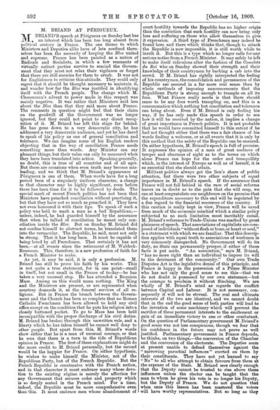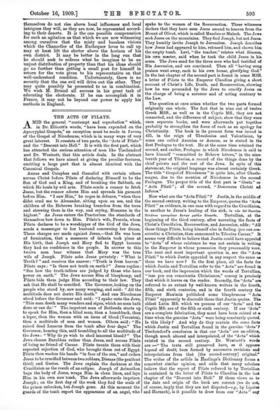M. BRIAND AT PgRIGUEUX.
MBRIAND'S speech at Perigueux on Sunday last has „ an interest which has been too long absent from political oratory in France. The one theme to which If" "'Akre and Deputies alike have of late confined them- selves has been the necessity of keeping the Bloc united and supreme. France has been painted as a nation of Radicals and Socialists, in which a few remnants of virtually- extinct parties survive to remind the Govern- ment that they must not relax their vigilance or forget that there are still enemies for them to crush. It was not for Englishmen to criticise this attitude. They could only regret that it should be thought necessary to maintain it, and wonder how far the Bloc was justified in identifying itself with the French people. The change which M. Clemenceau's advent to power made in this respect was mainly negative. It was rather that Ministers said less about the Bloc than that they said more about France. The remnants in question might feel that their claim on the goodwill of the Government was no longer ignored, but they could not point to any direct recog- nition of it. M. Briand has left this stage far behind. He has gone down to a very democratic city, he has addressed a very democratic audience, and yet he has dared to speak of his policy as one of general conciliation and tolerance. We can imagine some of his English readers objecting that in the way of conciliation France needs something more than words. Any Minister can say pleasant things, but their value can only be measured when they have been translated into action. Speaking generally, no doubt, this is true of all countries and of all ages. But there are occasions when even truth may become mis- leading, and we think that M. Briand's appearance at Perigueux is one of them. When words have for a long period been of a singularly Uniform character, a change in that character may be highly significant, even before there has been time for it to be followed by deeds. The special mark of recent French politics has not been that Ministers have preached conciliation without practising it, but that they have not so much as preached it. They have not even honoured it with their lips. To speak of such a policy was held to mark a man as a bad Republican,— unless, indeed, he had guarded himself by the assurance that when he talked of conciliation he meant only con- ciliation inside the Bloc. But on Sunday M. Briand did not confine himself to abstract terms, he translated them into the vernacular. The Republic, he said, must not only be strong. That it has long been. It must be capable of being loved by all Frenchmen. That certainly it has not been,—at all events since the retirement of M. Waldeck- Rousseau. This, therefore, is a new profession of faith for a French Minister to make.
As yet, it may be said, it is only a profession. M. Briand has still to prove his faith by his works. This is not quite a true statement, for in one point—small in itself, but not small in the France of to-day—he has taken a very unusual step. He has attended a Requiem Mass. Among us this would mean nothing. The King and the Ministers are present, or are represented when courtesy demands it, at the funeral services of all re- ligions. But in France the breach between the Govern- ment and the Church has been so complete that no Roman Catholic Frenchman has been allowed to hold any civil office except on the condition that he puts his religion into a closely buttoned pocket. To go to Mass has been held incompatible with the proper discharge of his civil duties. M. Briand has broker through this unwritten rule, and a liberty which he has taken himself he cannot well deny to other people. But apart from this, M. Briand's words show either that he is a man of unusual courage, or that he sees that there is a turn in the tide of Republican opinion in France. The first of these explanations might do the more credit to M. Briand personally, but the second would be the happier for France. On either hypothesis, he wishes to male himself the Minister, not of the Republican Party, but of the French Republic. But the French Republic is coextensive with the French nation, and in that character it must embrace many whose devo- tion to the existing regime is merely the affection for any Government that secures order and property which is so deeply seated in the French mind. For a time, indeed, the Republic must be more comprehensive even than this. It must embrace men whose abandonment of overt hostility towards the Republic has no higher origin than the conviction that such hostility can now bring only loss and suffering on those who allow themselves to give it expression. A third type of Frenchman may indeed be found here and there which thinks that, though to attack the Republic is now impossible, it is still worth while to insult it. But this is a type which no longer calls for any serious notice from a French Minister. It may safely be left to make itself ridiculous after the fashion of the Camelots du Roi who on Sunday showed their strength and their knowledge of their countrymen by backing a cab into the crowd. If M. Briand has rightly interpreted the feeling of his countrymen, the consolidation and permanence of the Republic are assured in a far more real sense than by whole cartloads of imposing announcements that the Republican Party is strong enough to trample on all its foes. What France really needs is that there should cease to be any foes worth trampling on, and this is a consummation which nothing but conciliation and tolerance can bring about. Even if M. Briand is only feeling his way, if he has only made this speech in order to see how it will be received by the nation, it implies a change of great importance in French politics. It is not probable that he would have committed himself to this extent if he had not thought either that there was a fair chance of his words finding a welcome, or at all events that it is only by this method that the safety of the Republic can be ensured. On either hypothesis, M. Briand's speech is full of promise. It expresses the opinion of a man of great coolness of temper and clearness of sight as to the terms on which alone France can hope for the order and tranquillity which, in the interest of Europe as well as of herself, it is so essential that she should attain.
Militant politics always get the lion's share of public attention, but there were two other subjects of equal importance in M. Briand's speech. If the assurance that France will not fall behind in the race of social reforms leaves us in doubt as to the gain that she will reap, we can at least congratulate our neighbours on the promise that the expenditure necessary to this end will be regulated by a due regard to the financial resources of the country. If this caution is really kept in view, France will be saved from much of the economic mischief which a similar policy subjected to no such limitation must inevitably entail. M. Briand's reference to Trade-Unions was marked by great plainness of speech. That associations of capitalists are com- posed of individuals "without flesh or bone, or heart or soul," is a statement with which we are familiar That this descrip- tion applies with equal truth to associations of workmen is very commonly disregarded. No Government will do its duty, no State can permanently prosper, if either of these facts is put aside. " An association," says M. Briand, " has no more right than an individual to impose its will to the detriment of the community." Our own Trade Disputes Act is the legislative denial of this Rrinciple, and France is happy in the possession of a Prune Minister who has not only the good sense to see this—that we do not doubt is possessed by our own statesmen—but the courage to proclaim it without flinching. We are wholly of M. Briand's mind as regards the conflict between Capital and Labour. It is not necessary, con- sequently it will not be eternal. The real and ultimate interests of the two are identical, and we cannot doubt that in the end the good sense of both parties will lead to the invention of sonic machinery which will prevent the sacrifice of these permanent interests to the excitement or gain of an immediate victory to one or other combatant. On the question of Parliamentary government M. Briand's good sense was not less conspicuous, though we fear that his confidence in the future may not prove as well justified. Parliamentary government in France depends, he thinks, on two things,—the conversion of the Chamber and the conversion of the electorate. The Deputies seem at present unable to defend themselves against the " narrowing parochial influences " exerted on them by their constituents. They have not yet learned to say " No " to all who attempt to obtain favours from them at the expense of the State. M. Briand sees clearly enough that the Deputy cannot be trusted to rise above these influences unless the elector can be taught that the man to whom he gives his vote is no longer his Deputy, but the Deputy of France. We do not question that when once this lesson has been mastered the voters will have worthy representatives. But so long as they themselves do not rise above kcal influences and local intrigues they will, as they are now, be represented accord- ing to their deserts. It is the one possible compensation for such an agitation as that which we are now witnessing among ourselves that the misty and baseless visions which the Chancellor of the Exchequer loves to call up may at least lift the elector above the horizon of his own district. It may be better in the long run that he should seek to redress what he imagines to be an unjust distribution of property than that his ideas should go no further than getting a small post for himself in return for the vote given to his representative on that well-understood condition. Unfortunately, there is no security that the one evil will drive out the other. They may quite possibly be presented to us in combination. We wish M. Briand all success in his great task of educating the electorate. If he can accomplish it in France, it may not be beyond our power to apply his methods in England.















































 Previous page
Previous page